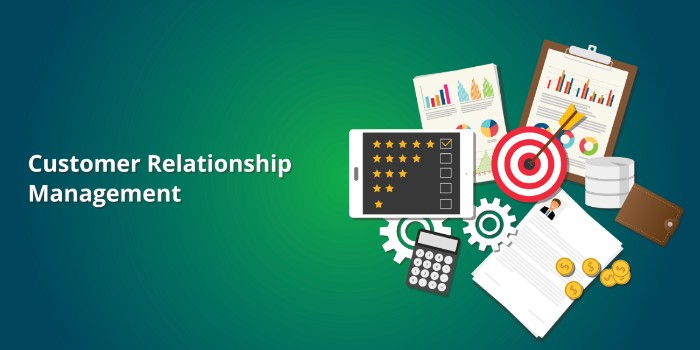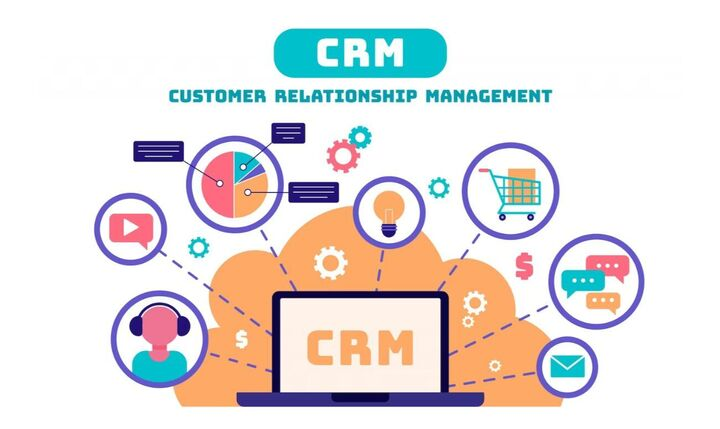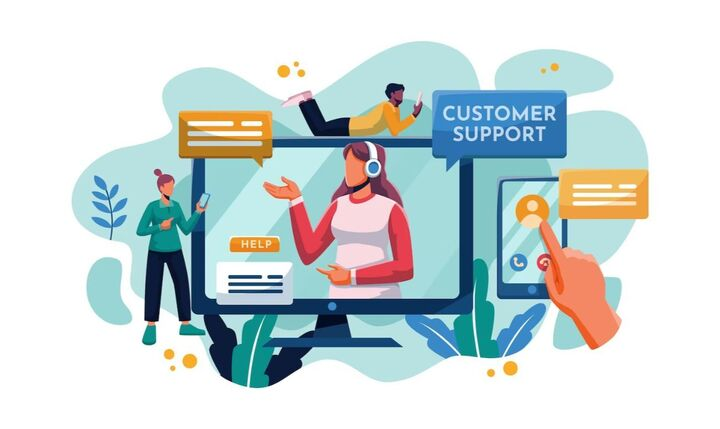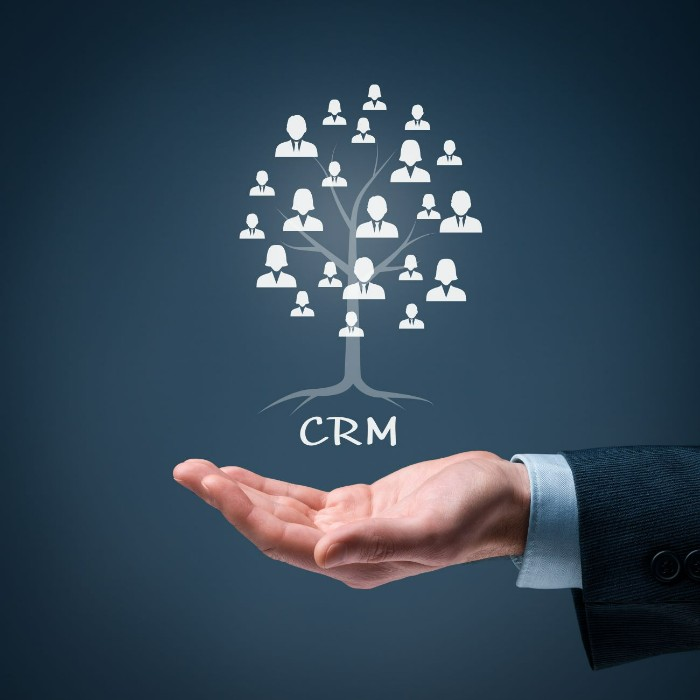
As a business owner, you know that customer relationships are the backbone of success; your ability to connect with customers and provide them with a fantastic experience is critical for long-term growth. But keeping up with customers’ needs can take time as businesses expand. Therefore, it’s essential to find ways to make customer data tracking easier so that you can continue delivering excellent service and fostering loyal relationships. One way to do this is by using Customer Relationship Management (CRM) software: a powerful tool that allows companies to quickly monitor customer interactions, create stronger connections, and increase sales revenues over time.
Here are 12 reasons why having CRM software for your business is essential to reach new heights of success!
But before going into details, let’s understand CRM and how it works.
How does CRM Software work?
The business has numerous customers who store their information in various formats, including Spreadsheets, sales reports, contact logs, scheduled appointment dates, and bookings data. When sales teams try to manage all of their data directly, it becomes a significant burden on their time and resources. Therefore, implementing customer relationship management (CRM) software contains all sales, contact management, and customer data and ensures lasting relationships.

So, CRM software is a platform that helps businesses create and maintain meaningful relationships with their customers and prospects. With CRM software, companies can easily track customer data and interactions to provide the best possible service. For example, the company can use CRM to track customer support calls, record sales inquiries, and store contact information.
In today’s competitive world, businesses are increasingly relying on CRM software to help them stay organized, streamline their processes and gain valuable insights into their customers’ needs. With its ability to capture essential data, track customer interactions, facilitate communication and provide analytics, CRM software is vital for any business that wants to grow and succeed.
For more information regarding choosing the best CRM software, visit the link – Excellent Cost-Effective CRM Software To Boost Your Business.
What influence does CRM have on your business?
CRM software significantly influences businesses, allowing companies to monitor, manage and nurture customer relationships effectively.
Improves Customer Service
CRM platform makes it easier to respond quickly to customer inquiries and requests, which goes a long way in improving customer satisfaction. With CRM, businesses can provide more personalized service and build stronger customer relationships.
Better Sales Performance
By using CRM platforms to track customer data (which also helps in sales forecasting), sales reps can quickly identify potential leads and opportunities to close more deals. As a result, sales analytics helps businesses increase sales revenues over time.
Automates customer tracking
A CRM system allows businesses to track customers’ preferences, interests, and buying habits, which can help you customize your offerings according to their needs.
Enhances customer experience
With the right CRM software in place, companies can Interact well around multiple channels and provide immediate responses with personalized solutions that make them feel valued and appreciated.
Increases sales
By leveraging the detailed insights and personalized recommendations offered by CRM software, companies can develop targeted marketing campaigns, improve lead conversion rates and boost sales.
Streamlines communications
Businesses can use CRM systems to store customer contact information and track all communication between the company and its customers to ensure a seamless experience.
Improves data accuracy
Businesses can centralize customer data in one place to ensure accuracy and avoid duplication of records.
Enhances team collaboration
Businesses can provide their teams visibility into customer data and insights to enable better collaboration among employees.
How CRM software assists small businesses in growing?

CRM (customer relationship management) software is an ideal solution for small business owners and can be one of the most effective tools to ensure proper growth.
Initially, businesses kept records and managed information manually to provide the best customer service possible. However, due to their inability to efficiently manage large amounts of data manually, they are forced to limit their customer base, which slows their business growth.
Therefore, CRM plays a crucial role in promoting the development of small businesses, as it has brought about significant changes in how companies manage data, records, and customer activities and histories. Regardless of the number of customers a business has, businesses can now organize everything effectively with CRM tools.
CRM also assists small businesses in attracting more prospects through the use of email campaigns and sales pipeline monitoring. In addition, it enables multiple business teams to access centralized data anywhere and at any time.
Many CRM providers offer free plans and provide 24/7 premium support, so small businesses can easily understand how to utilize CRM technology and provide help in case any issues arise for the best results.
The right CRM software for small business operations can significantly keep customers satisfied and follow sales opportunities up on; conversations are tracked and organized, data glean business insights, and much more.
By utilizing a basic CRM, small businesses can have access to customer relationship management systems that will help them capture leads, stay organized, analyze sales data, and gain deep visibility into their activities and customer relationships; this visibility enables them to identify strengths and weaknesses as well as pinpoint any areas that need improvement or optimizations.
Reasons why businesses need CRM software in business growth
There are several reasons why businesses need CRM to grow and succeed.
Following are the various reasons of CRM software that make it so beneficial for businesses:
CRM software helps businesses manage and centralizes customer data
With the implementation of CRM software, businesses can dramatically improve contact management and lead management. Gone are the days of teams wasting time digging through piles of records to find customer information – with this software, all customer data is centralized and easy to access for everyone among various teams anytime and anywhere.
Besides saving a lot of time and resources, it allows the sales rep to instantly retrieve their contact’s latest information, providing customers with a seamless experience. In short, CRM software helps businesses remove silos and redundancy while keeping teams informed and customer relationships strong.
With CRM software at the centre of their operations, businesses can manage and store contact data more intelligently and faster than ever before.
CRM software can help businesses track and manage customer interactions.
This software allows the sales team to capture every communication (emails, calls, chats, web interaction) between them and their customers in one centralized place. That makes it easier for teams to keep track of customer history, enabling more insight into customer needs and preferences. CRM software provides a 360-degree view of customers and is an invaluable resource for building relationships.
By analyzing and gleaning insights about customers’ interactions with the company, teams can better understand their objectives and intentions and communicate with them accordingly. Then, based on their interactions, send them more personalized emails and messages, increasing the likelihood of lead conversion and customer retention.
CRM software can help businesses measure performance metrics.

Business managers can monitor individual performance metrics such as lead conversion rate or the total number of deals closed in any period. That helps teams gain visibility into the overall performance of their sales activities and provide valuable insights that help to identify areas for improvement, optimize processes, and achieve better results in the future.
Finally, CRM solutions can help businesses accurately measure performance and better understand customer preferences.
Businesses can better understand their customers’ preferred products or services by leveraging data from previous customer interactions. That will enable them to market these products and services more effectively, increasing sales and improving customer satisfaction.
Businesses can segment customers and target them with specific marketing campaigns.
Segmentation in CRM is grouping customers based on common characteristics, such as age, gender, location, interests, preferences, and purchase history. That helps businesses to target specific customer groups with tailored marketing campaigns that are more likely to resonate with them.
By segmenting customers according to their preferences, interests, and behaviour, businesses can create more effective marketing campaigns tailored to each customer. That enables them to deliver the most relevant and engaging messages that will resonate with customers and encourage them to take action.
Through customer segmentation, businesses can also identify potential new audiences for their products or services by targeting those with similar interests and behaviours as existing customers.
CRM solution lets them track campaign success rates compared to earlier campaigns and identify areas for improvement.
By leveraging the power of CRM platforms combined with segmentation targeting techniques, businesses can increase customer satisfaction levels and improve sales numbers.
Generate leads with email marketing campaigns through email integration.

Using the best CRM solution with email integration allows businesses to accelerate sales efficiently by reaching out to potential customers and generating more high-quality leads. In addition, companies need not purchase other business software(email marketing software) that is separate from the CRM for running email campaigns.
Email integration within a CRM will enable best practices like sending automated emails, running tailored email campaigns, and displaying campaign results in personalized dashboards – all with the ability to use provided email templates.
With CRM and email integration, it updates customer data automatically with every interaction and email sent, along with Email tracking so businesses can measure their campaigns’ success. That will help them identify areas of improvement or opportunities to optimize their results by testing different strategies.
Companies can now easily manage their lead generation activities more efficiently and effectively (third-party integrations) and generate higher leads faster with excellent conversion rates.
Explore more email marketing features and understand how it benefits your business – Benefits of Email Marketing.
Track lead progress through the sales pipeline

CRM solutions provide businesses with powerful tools for tracking and managing their leads through their sales pipeline. That allows companies to gain an accurate view of each lead’s stage in the buyer’s journey and make changes as needed. For example, if a business notices that specific sales leads take too long to convert, they can contact them or adjust their marketing campaigns as needed.
Additionally, by tracking lead progress through the sales pipeline, businesses can analyze which areas of the channel are converting best and where to make improvements.
CRM also provides customizable pipelines to match each company’s unique sales process, making it easier for teams to manage and monitor their sales activities.
These combined features make CRM an invaluable asset for any business looking to optimize its sales process. Read more on creating a competitive sales pipeline.
CRM customization by company needs
Companies looking to tailor their CRM services to their needs should take advantage of the capabilities of customizing. With the rapid growth of CRM services, large sales teams have embraced customization to keep up with their ambitious sales strategies and processes.
Companies of all sizes have seized this opportunity to personalize CRM programs to track customer relationships and better serve their clients. From automated marketing emails to outsourcing technology tasks, CRM customization enables organizations to hone in on specific company needs.
Empower any organization with CRM customization tailored to their unique operations and created for continued success.
Departmental collaboration to boost revenue

Departmental collaboration is becoming increasingly important to businesses looking to maximize their revenue. By bringing together teams from different departments, such as marketing and sales, companies can ensure that all aspects of their customer-facing operations are effectively aligned and working towards the same goal.
Through departmental collaboration, businesses can utilize the expertise of each team to create more effective strategies for engaging with customers. That could include leveraging data gathered from marketing campaigns to inform sales techniques or using insights from customer service feedback in product design decisions.
Collaboration between departments also allows businesses to streamline processes and better align cross-functional activities, making them more efficient and cost-effective.
By integrating CRM systems with automated processes across departments, businesses can further foster collaboration by providing a single source of truth for all customer information. That enables teams to access up-to-date customer records quickly.
Improves customer retention
Customer retention is an essential element of a successful business. By leveraging the data-driven insights (historical sales data) provided by CRM software, companies can build long-lasting relationships with their customers and ensure that they remain loyal for years to come.
CRM systems allow businesses to track customer interactions over time, enabling them to identify potential areas of improvement to serve their customers better.
Furthermore, with the help of automated processes through CRM systems, businesses can send out timely and relevant communications, such as promotional offers and discounts, to customers who show signs of attrition. As a result, it encourages them to stick around rather than look elsewhere for better deals.
Businesses can also take advantage of features like sentiment analysis which helps them measure customer sentiment toward their products or services. Such insights enable marketers to better understand what is working (or not) in their marketing strategies, allowing them to adjust campaign messaging accordingly to increase customer loyalty.
Businesses can close more deals by providing sales teams with relevant information.

CRM helps businesses track customer conversations and interactions, enabling sales teams to provide more accurate information to customers. That ensures that customers receive the most up-to-date and relevant information about products or services and encourages them to purchase.
Sales teams can use CRM features to quickly access detailed customer histories, including all previous conversations and follow-up activities. That lets them personalize their interactions with each customer and close deals faster.
Overall, by providing sales teams with the right tools, businesses can close more deals faster and improve customer satisfaction.
Improve customer service by tracking customer issues.

A comprehensive way to improve customer service is to track and monitor customer issues, gather data from different channels, and utilize them to understand customers’ business needs.
By leveraging entire sales process data and CRM capabilities, businesses can discover hidden gems needed for deep insights into customer communications. That helps them anticipate customer issues, identify trends in their industry, and adjust operations accordingly for optimal outcomes and better customer service.
Customer service teams and customer support teams play a vital role in ensuring customer satisfaction. By utilizing workflow automation, our highly trained professionals can provide the best customer services quickly, efficiently, and reliably on demand.
Through proactivity and unique problem-solving, we have established a reputation for leading the industry in providing outstanding customer satisfaction. Every step of our process has been designed to prioritize and meet the needs of our valued customers.
Increase revenues by upselling and cross-selling to existing customers.

CRM systems can help businesses identify buying patterns and likings of their present customers. That allows them to up-sell or cross-sell relevant products that customers may be interested in, thus increasing revenue from the same customer base.
By leveraging data from customer interactions, businesses can identify the best time to offer additional services or products for a higher chance of success. For example, if a company notices that certain customers always make purchases during specific seasons, it can use this information to target those customers with timely offers or discounts.
Reduce costs by automating lead generation and client follow-up.
CRM platforms provide businesses with automation features to automate mundane tasks such as lead generation and customer follow-up, allowing them to save time and resources.
Automating business processes such as lead generation and client follow-up can reduce operating costs while increasing productivity and efficiency.
Using a CRM platform that integrates third-party integrations like deal management and project management provides a comprehensive solution for automating critical business workflow and marketing automation. And with the included in-built email templates, business teams can quickly create automated emails to stay connected with customers, prospects, and partners.
This way, activities such as market analysis, customer onboarding, customer outreach, and customer care are easy to manage without relying on manual labour.
Choose the Best CRM software for your business.

When choosing the best CRM solutions for your business, it’s essential to consider several factors, such as scalability, customization, security, and customer service. Scalability is important because companies must ensure their CRM platform can grow with them as their needs and customer base increase. Customization is also essential as businesses must be able to customize the CRM to fit their specific needs.
Security must also be a priority when selecting a CRM platform since sensitive customer information is stored on the system. Finally, customer service should be excellent, so knowledgeable professionals can quickly address any issues or questions.
Fortunately, many of today’s leading CRM systems have all these features and more. In addition, they offer extensive automation CRM features that allow businesses to streamline everyday tasks such as lead generation, client follow-up, marketing automation, workflow automation, lead management, deal management, and project management.
Additionally, many of these systems come with comprehensive analytics tools that allow businesses to track customer interactions to gain deeper insights into how customers engage with their brand and products. This will enable them to customize messaging and offerings based on customer preferences to maximize revenue potential.
In addition to these features, some of the most popular CRM systems provide additional modules, such as customizable dashboards for sales teams and automated workflows for improved communication between departments or external partners. These features enable companies to increase efficiency while reducing time spent on mundane tasks, ultimately leading to increased profit margins.
Consider the following points before choosing the CRM solutions for your business:
Define your business goals and company size
The first thing you consider is the goals of your business(wants to increase sales or customer satisfaction) and determine the company size, as small businesses have different requirements than large enterprises.
Industry
Another thing to consider is the industry. Different industries have different requirements for their CRM systems. For example, a real estate company will need other functionality than a manufacturing company. So choose a CRM designed specifically for your industry to get the most out of it.
Consider your budget
Another essential factor to consider when choosing a CRM system is your budget. There are a variety of CRM systems available on the market, ranging in price from free to several thousand dollars. Therefore, choosing a system that fits your budget and offers the features and functionality you need is essential.
Evaluate your options
Once you have defined your business goals and considered your budget, it is time to evaluate your options. There are many different CRM systems available, so it is vital to take the time to research each one. Read online reviews, speak with other businesses that use CRM systems, and request demos or free trials from vendors before making your final decision.
Implement and train employees
Once you have chosen a CRM system, it is essential to implement it properly within your business. This includes training employees on using the system and ensuring all data is correctly entered. Additionally, it is crucial to monitor the performance of your CRM system on an ongoing basis and make changes as needed to ensure that it meets your business goals.
Finally, businesses of any size or complexity level must select a reliable CRM partner to help them succeed in the long term. Choosing a partner offering comprehensive support services, including training sessions, timely updates, and ongoing maintenance, will ensure that businesses stay up-to-date with industry trends while getting the maximum return from their investments.
EQUP is the best All-in-one CRM option that meets all the above requirements of businesses and offers free plans for a lifetime. It is the most efficient small business CRM software.
Conclusion
In conclusion, CRM software can assist all types of businesses, including small companies just starting, due to various features like customer outreach, messaging, and sales automation. CRM software facilitates an efficient workflow for the business and encourages growth. Free CRM is available with extensive features to get users started quickly.
Furthermore, given the advancements in technology today, managing customer relationships and workflows have never been easier! Therefore, if you currently run or operate a business – big or small – you should strongly consider investing in quality CRM software. Doing so can reap numerous rewards that help keep you organized and in control as your company grows.
We hope this article has enabled you to understand why every business should leverage a suitable CRM solution for success. So what are you waiting for? Get the best CRM software today and experience these remarkable capabilities firsthand!